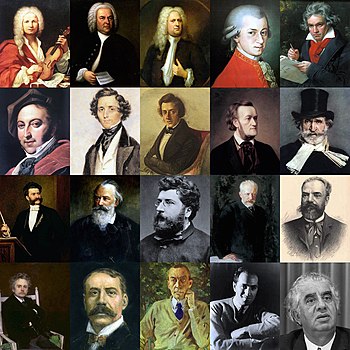 |
| Montage of great classical music composers - from left to right: first row - Antonio Vivaldi, Johann Sebastian Bach, Georg Friedrich Händel, Wolfgang Amadeus Mozart, Ludwig van Beethoven; second row - Gioachino Rossini, Felix Mendelssohn, Frédéric Chopin, Richard Wagner, Giuseppe Verdi; third row - Johann Strauss II, Johannes Brahms, Georges Bizet, Pyotr Ilyich Tchaikovsky, Antonín Dvořák; fourth row - Edvard Grieg, Edward Elgar, Sergei Rachmaninoff, George Gershwin, Aram Khachaturian (Photo credit: Wikipedia) |
In Jazz, of course, improvisation is a skill that almost every jazz musician lives by and there is so much experimenting with chord substitutions, scales and tonality that a listener can get a different feeling of the same piece when performed by someone different. So, much is left to the performer about how to perform a piece. Of course, you have to think about your tempo, articulations but there is more flexibility in performance, especially in slower jazz pieces such as ballads. A jazz piano teacher that I once studied under, left the improvisation up to me and my only guide was basically jazz albums and transcriptions if I wanted to spice up my playing with new ideas. However, there are times in which you have to play with a certain touch such as bebop music.
Much of the material in classical music seems to have starting points as seen in runs and the practice of scales. When you practice your scales, you always start at a point, go up and come back down since this is the way that sixteenth and thirty-second notes are played. This creates the mindset that you are aiming at accuracy and uniformity in your playing. In the music, you always know where your runs are starting and when you practice your technique, that is what you know and feel as well.
When you are improvising in jazz, soloing demands that you know your instrument so well that you should be able to start on any note, anywhere on your instrument and still be able to keep with the beat and form a musical idea. In certain jazz books, the method by which you practice your scales is different than in classical music. You are instructed to practice your scales starting on any note within that scale so that when you are soloing you are not restricted by certain stopping points.
In Jazz, there is an emphasis on the individual soloist in which the audience can feel where he/she is going with their music, often unscripted, from the soul and heart. The listener has to identify with the unpredictable and the exotic dance of harmony and melody. Make no mistake that in many jazz pieces, there is not always a wild, unpredictable element. Many jazz pieces can sound like other genres of music. Sometimes, a jazz musician has to make a decision as to how he/she will have to color a chord or measure with a certain flavor of sound. Now in classical music, the audience wants to feel Mozart or Beethoven through the performer in terms of being true and authentic. Any unpredictable elements will be expected as part of the composition.
These elements of classical and jazz music are only my observations and we must keep in mind that you cannot put classical or jazz music into a box. Both will always be different and similar in ways but both will share a willingness to bring out the greatness of the music, fast or slow, happy or sad.
|

No comments:
Post a Comment